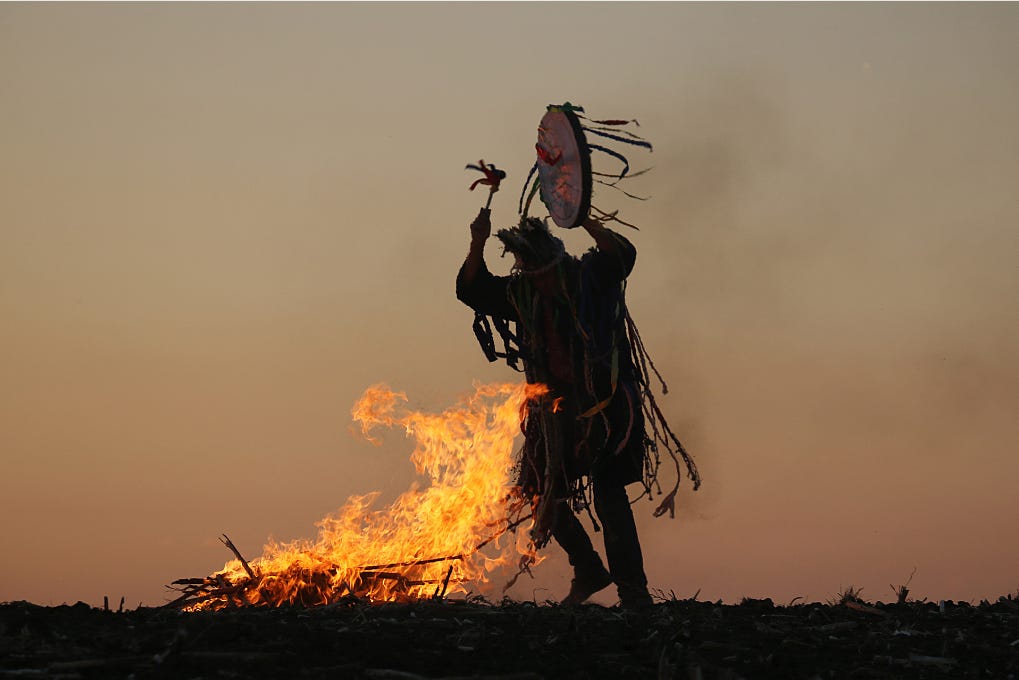The words shaman and shamanism are becoming increasingly a part of our conversation as more people are consulting shamans, becoming shamans and taking shamanic “journeys” as a path to healing and personal transformation.
So what exactly is a shaman? Are there more shamans now than before? What is a shamanic “journey?” Why is the type of astrology I practice referred to as “shamanic?”
Although there are archaeological studies that have shown shamanistic rituals and practices dating back tens of thousands of years, the term shaman was first coined by anthropologists to refer to the spiritual and ceremonial leaders of indigenous cultures around the world. However, the origin of the word is thought to be from the word saman in the language of the Tungus tribe in Siberia which means “one who is excited, moved, raised.”
Although there is no consensus or succinct definition of the word shamanism, perhaps the description offered by anthropologist, Michael Harner (1982), who spent years living with and studying Amazon tribes and later became a shaman himself, gets close:
“Shamanism might be defined as a family of traditions whose practitioners focus on voluntarily entering altered states of consciousness in which they experience themselves, or their spirit(s), traveling to other realms at will and interacting with other entities in order to serve the community.”
The variety of definitions all seem to suggest contacting and utilizing ordinarily hidden reality to acquire knowledge and wisdom with the intent to empower and help others to heal and transform. According to their website at Dance of the Deer Foundation, “Aspects of Shamanism” include:
Connection with nature
Healing of Self & Community
Spiritual Practice
Pilgrimage to Sacred Places
Vision & Ceremony
In these ways, the Shamanic Astrology Paradigm™ is true to its title. From the founder of this approach and of the Turning of the Ages Mystery School, Daniel Giamario:
“It is the union of the client and the astrologer, and the astrologer and the sky, all having a soul-to-soul, direct connection. The transmission is heart-to-heart between human beings … What takes place, soul-to-soul in that moment of the chart reading between the astrologer, the client, and Great Mystery … this is what causes astrology to work. It is a living dynamic in that precise moment. …
“What makes it shamanic is its connection to the living energies of the planets themselves, to the starry patterns of the particular season, to the particular shape of the land the reading is occurring on, perhaps that specific rock one can see over there on the horizon, or the jarring squawk or a raven at the exact time something is spoken – all these factors go into the magic that happens when the divination of the astrological moment unfolds.”
A reading of your natal chart is an experience of the unique mandala of the cosmos at the moment of your birth. Rather than simply a description of your personality or a prediction of events, this starry story unfolds in the moment to reveal a pattern of the living energies contributing to your soul’s growth and evolution in this lifetime.
The Shamanic Astrologer facilitates the connection with you, the cosmic energies and Great Mystery – the Above and Below – in a way that allows a deep, transformative knowing and understanding of your Self and your original soul’s intent. In this way, the experience is shamanic in that it connects us with nature’s energies and cycles, it is a spiritual time of healing and transformation, and it is shared ceremony and pilgrimage giving new purpose and vision.
After more than 20,000 readings over his lifetime and counting, Daniel knows, “The thing people most desire is to be ‘gotten.’ They want to be deeply and accurately mirrored. They want to have their authentic identity affirmed, to know that they aren’t ‘bad’ or ‘wrong.’ When mirrored accurately at a soul level, a new base of self-love can emerge, helping them address how they became estranged from their true nature.” (From Article “So What Exactly Makes It Shamanic?” by Beau Taylor)







I love the message here, Lizzie - thanks so much for sharing it ☺️
As for the question? While I think many of my practices are 'shamanic,' I do not call myself 'a shaman.' I tend to actively avoid self-applied titles, helps me stay humble 😉 But I have known others who I certainly consider shamans, so I appreciate your words here 🫡
Felt inspired reading this. Thank you.